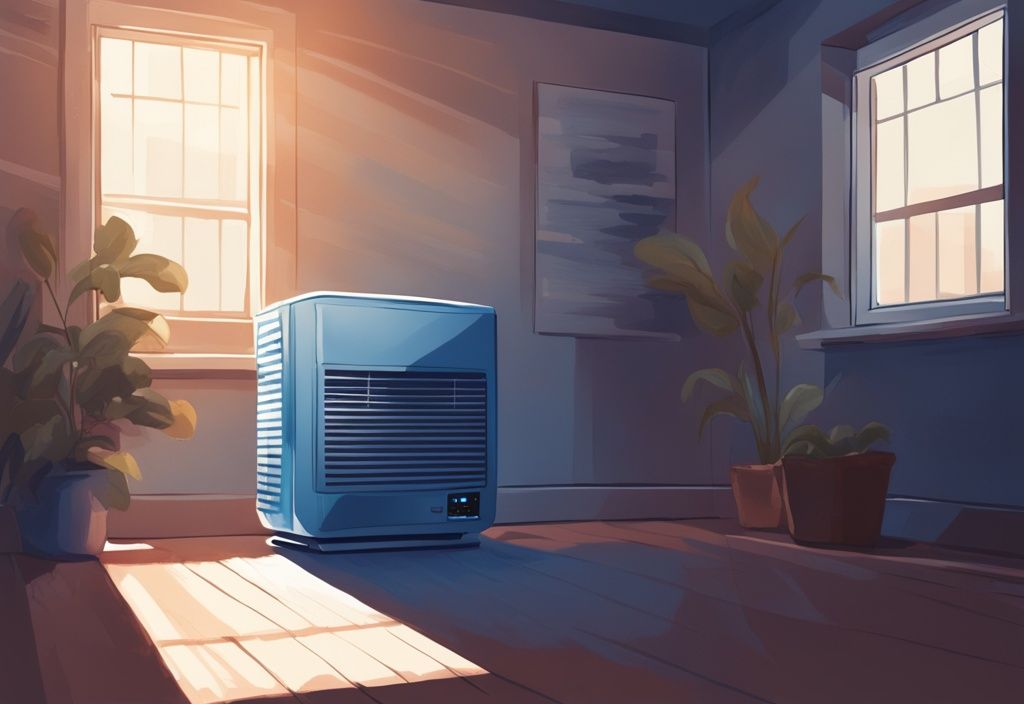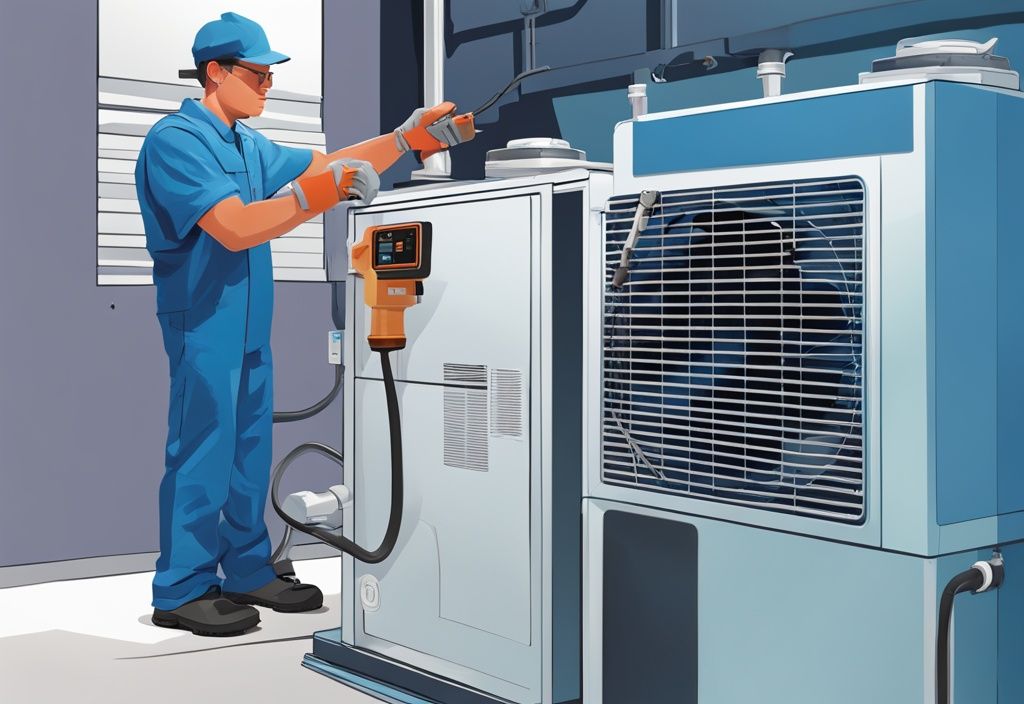Best Basement Window Air Conditioner: Optimal Cooling Solutions
Ever feel like that muggy basement of yours is a lost cause, constantly trapped with unwanted warmth? Well, folks, let me introduce you to the basement window air conditioner. It pulls double duty: cooling your underground spot and doing it energy-efficiently.
Get ready for a deep dive into the ins and outs of these units, uniquely tailored for that tricky basement environment. We’ll cover crucial features, installation hacks, and those gotcha moments that often catch you off guard.
With the right tools from this guide, you’ll be combating that oppressive heat and humidity in no time. Stick with me, and let’s transform that basement of yours into a cool sanctuary, shall we?
Understanding Basement Window Air Conditioners
When it comes to cooling down your basement, a regular air conditioner won’t always do the trick. Let’s dive into what makes basement window air conditioners unique and why they’re a better fit for these often tricky spaces.
Definition of a Basement Window Air Conditioner
A basement window air conditioner is your go-to solution for keeping that underground space cool. These units are:
- Designed for Efficiency: They cool basement spaces efficiently, tackling the unique challenges these areas present.
- Built for Basements: They handle limited windows and high humidity like a pro.
- Consistent Comfort: They create a cozy environment, no matter how hot it gets outside.
Differences Between Regular Window and Portable Air Conditioners
Not all air conditioners are created equal, especially when it comes to basements. Here’s why basement window units stand out:
- Regular Window Units: These are installed in a window and vent through it, ideal for above-ground spaces but not always suitable for basements.
- Portable Units: They sit on the floor and vent through a hose, needing an opening. While flexible, they may not handle basement conditions well.
- Basement Window Units: Engineered specifically for the enclosed, humid environment of basements, making them more effective than regular units.
Key Features of Basement Window Air Conditioners
Basement window air conditioners are an excellent choice for cooling those often challenging basement spaces. These units are specially designed to tackle the unique environment found in basements, ensuring optimal comfort and efficiency.
Powerful Cooling Capacities
- These units pack a real punch when it comes to cooling down warmer and enclosed basement areas. With their robust cooling power, a basement window air conditioner makes sure the air stays cool and comfy, no matter how hot it gets outside.
- They come in a variety of BTU (British Thermal Unit) ratings, meaning you’ll find a model suited for any room size. This flexibility helps in achieving just the right amount of cooling for your specific basement dimensions.
Handling Humidity and Mold Prevention
- One standout feature of a basement window air conditioner is its capacity to manage the high humidity levels typically found below ground. These units can significantly reduce indoor moisture, effectively preventing the dreaded mold and mildew growth.
- However, in particularly humid basements, you might still need an extra dehumidifier to maintain optimal humidity levels and ensure a truly mold-free space.
Energy-Efficient Operation
Compared to central air systems, basement window air conditioners are a more energy-efficient option, leading to notable savings on your energy bills. These standalone units cool only the areas you need, thereby avoiding the waste of cooling unoccupied spaces.
- Many modern models boast Energy Star ratings, which guarantee better energy savings and a reduced environmental footprint over time. To learn more about energy-efficient appliances and how to reduce your electricity use and bills, you can explore additional resources here.
Additional Features in Modern Models
Today’s basement window air conditioners come with a host of convenient features. These extra bells and whistles make them not only user-friendly but also significantly more effective in maintaining your desired comfort level.
- Modern units often come with remote controls and programmable timers, allowing you to operate the AC effortlessly, whether from a distance or on a set schedule.
- These models offer various cooling modes, including cooling, fan-only, and dehumidification settings, providing tailored solutions for different climate needs within your basement space.
- Security features like automatic shutoff mechanisms protect your unit during overheating or power surges, enhancing overall safety.
- Some advanced models even include smart AC controllers, enabling you to automate operations and control the unit remotely via your smartphone or smart home system, adding another layer of convenience and energy management.

Benefits of Using a Basement Window Air Conditioner
Utilizing a basement window air conditioner brings a range of advantages, particularly tailored for the unique demands of basement environments. Let’s dive into some key benefits you can enjoy.
Efficient Cooling for Enclosed Spaces
- Effective Cooling: When it comes to cooling small to medium-sized basements, a basement window air conditioner does a stellar job. These units are built to provide effective cooling, ensuring your basement stays comfortable throughout the year.
- Zone Cooling: The beauty of zone cooling is that you can keep your basement at a different temperature from the rest of your home. It’s like treating each room as its own little world, giving you customized comfort where you need it most.
Humidity Control to Prevent Mold
- Moisture Reduction: Basements can be breeding grounds for mold due to excess moisture. A basement window air conditioner steps in to reduce that moisture, keeping those pesky molds at bay.
- Improved Air Quality: Let’s face it, basements can get stuffy. But with a basement window air conditioner, the air quality improves significantly, making the space not just livable but pleasant and healthier to be in.
Cost-Effective Cooling Solution
- Cost Savings: Installing a basement window air conditioner means avoiding pricy HVAC modifications. This leads to substantial savings on your installation costs.
- Affordable Initial Costs: Compared to central air systems, the initial purchase and installation of a basement window air conditioner are much more wallet-friendly. It’s a smart and economical choice for homeowners.
Improved Air Circulation and Ventilation
- Enhanced Airflow: Ensuring good airflow in confined basement spaces can be tricky. A basement window air conditioner does wonders by enhancing the airflow, fighting off air stagnation, and keeping the area comfortable.
- Boosting Circulation: For an even better ventilation setup, consider pairing your unit with exhaust fans. This combo can further improve air circulation, leading to a fresher basement atmosphere.
How to Choose the Right Basement Window Air Conditioner
Selecting the perfect basement window air conditioner involves considering several key factors to ensure optimal performance and comfort. Understanding these elements will help you make an informed decision that suits your specific needs.
Determining the Correct Size and BTU Rating
Choosing the correct BTU rating for your basement window air conditioner is crucial for efficient cooling. An undersized unit will struggle to cool the space, leading to overworking and higher energy consumption. Conversely, an oversized unit will cycle on and off too frequently, wasting energy and failing to dehumidify properly.
To determine the right BTU rating, measure your basement’s square footage and consult BTU charts that match room size to appropriate cooling capacities. Remember, an accurately sized unit will maintain a comfortable indoor climate without unnecessary energy waste.
Considering Energy Efficiency
Energy efficiency plays a vital role in selecting a basement window air conditioner, as it directly impacts your energy bills. Look for models that have earned the Energy Star rating, indicating they meet or exceed specific energy efficiency criteria set by the EPA.
Additionally, consider the unit’s Energy Efficiency Ratio (EER) and Seasonal Energy Efficiency Ratio (SEER). Higher numbers in these ratings indicate better energy efficiency, leading to long-term savings. Investing in an efficient unit not only benefits your wallet but also helps the environment.
Evaluating Noise Levels
Noise levels are a significant consideration, particularly if your basement is used as a living space or home office. Check the decibel (dB) rating of the air conditioner; lower dB levels indicate quieter operation.
Ideally, opt for units with noise levels below 60 dB for minimal disturbance. Many reviews and product specifications offer insights into the sound levels you can expect, helping you choose a unit that won’t disrupt your peace.
Important Additional Features to Look For
Modern basement window air conditioners come with a variety of features designed to enhance convenience and performance. Here are some features to consider:
- Programmable Timers and Remote Control: Allow you to set cooling schedules and operate the unit from a distance, ensuring a comfortable environment upon arrival.
- Digital Displays: Provide clear and easy-to-understand readouts for current settings, temperature, and modes.
- Safety Features: Auto shutoff functionality can protect the unit from overheating or during power surges.
- Customizable Airflow Directions: Helps direct the cool air where it’s needed most, enhancing overall comfort.
By keeping these considerations in mind, you can ensure that you select a basement window air conditioner that is perfect for your space, offering efficient cooling, quiet operation, and modern conveniences.
Installation Guide for Basement Window Air Conditioners
Installing a basement window air conditioner can be a manageable DIY project when you’re armed with the right guidance. Follow these steps to ensure a smooth installation process and efficient performance.
Measuring and Preparing the Window
- Measuring Dimensions: First things first, get your metal tape measure and accurately measure the width and height of your window. You want to be sure your basement window air conditioner will fit just right.
- Assess Stability: Take a good look at the window frame. Ensure there are no signs of instability or weaknesses. It’s important because the window needs to support the weight and vibration of your air conditioner unit.
- Check for Draft Points: Identify any possible draft points around the window frame. Sealing these with weather stripping or caulk will prevent air leaks and boost insulation.
Step-by-Step Installation Process
- Fit the Unit Securely: Make sure the window opening is large enough for your basement window air conditioner. The unit should fit snugly but not be squeezed in.
- Efficient Venting Solutions: Use venting solutions that match your basement window’s layout. Adjustable side panels or custom-cut acrylic sheets work wonders for a perfect fit.
- Use CNC-Machined Panels: Opt for CNC-machined panels. They ensure a neat, secure fitting, and help in avoiding unnecessary gaps, which in turn increases efficiency.
Ensuring Proper Ventilation
- Maintain Adequate Airflow: Ensure the vents are unobstructed. Good airflow is essential to prevent overheating and maintain the effective operation of your basement window air conditioner.
- Insulate Around the Unit: Apply insulation materials around the edges of the air conditioner. This minimizes the infiltration of hot air from outside, keeping your basement at a stable temperature.
Securing and Insulating the Unit
- Seal All Gaps: Make sure all gaps around the basement window air conditioner are sealed properly. This will prevent heat exchange and enhance the cooling efficiency of the unit.
- Secure the Unit: Use methods like glazier push points, adhesive tape, or Velcro strips to securely fasten the unit in place. A securely fastened unit reduces vibrations and noise during operation.

Maintenance Tips for Optimal Performance
Maintaining your basement window air conditioner is crucial for extending its lifespan and ensuring it runs efficiently. Regular upkeep can prevent common issues and keep your unit in top shape. Let’s dive into some practical tips for maintaining your AC.
Regular Filter Cleaning
- Keeping your filters clean is essential. Dust buildup can impede airflow, forcing your basement window air conditioner to work harder. This not only reduces efficiency but can also compromise air quality. Just clean those filters frequently. Trust me, it makes a huge difference!
- Don’t forget to replace filters as per the manufacturer’s guidelines. Depending on usage and your environment, this might be every one to three months. By sticking to this schedule, you’ll help prolong the life and performance of your unit.
Inspecting for Water Leaks and Blockages
- Check the drainage system regularly. Leaks or blockages can cause major headaches, from damaging your basement to harming the AC unit. Regular check-ups can prevent these issues.
- Make sure water is venting properly. If the venting system is clogged, it can lead to water buildup and mold growth. Proper drainage is essential for a healthy and efficient cooling environment.
General Troubleshooting Tips
- Always keep an eye on the unit’s settings and operation. Ensure your basement window air conditioner is set to the right mode and temperature. If there are any issues like the unit not turning on or strange noises, adjust the settings and see if that helps.
- Your user manual is your best friend. It contains specific troubleshooting steps for your model, covering common problems and maintenance tips. Having it handy can save you a lot of time and effort in resolving minor issues.
Addressing Common Issues with Basement Window Air Conditioners
Water Leakage Issues and Solutions
Water leakage is a frequent hiccup with basement window air conditioners. First off, make it a habit to check the drainage setup regularly for clogs or obstructions. Trust me, nothing’s worse than finding your unit flooded because of a simple blockage. Next, proper venting is crucial. Blocked vents can cause water to back up, and that’s never a good thing. Give the seals around the unit a good once-over from time to time. Intact seals prevent leaks by stopping water from sneaking into your basement. If the seals look worse for wear, don’t wait—replace them. It’s a small price for peace of mind and a dry basement.
Inadequate Cooling and Possible Causes
If your basement window air conditioner isn’t cooling like it used to, it might be a sizing issue. Make sure the unit is appropriately sized for the space. An undersized unit will struggle to hit those comfy temperatures, while an oversized one just wastes energy. And while you’re at it, check the cleanliness of the filter. A dirty filter isn’t just gross—it restricts airflow and hampers the unit’s efficiency. Lastly, clear any obstacles around the air conditioner. Good airflow is crucial for keeping things cool. If the unit is obstructed, it simply can’t do its job well.
Fan Problems and How to Fix Them
Fan issues can really throw a wrench in things. Start by giving the fan blades a good look for dust. Dusty blades can sabotage the fan’s performance. Regular cleaning is key to a smooth operation. Next, check the fan’s functionality. If it’s making weird noises or refuses to spin, it might be time for a replacement. A little maintenance goes a long way—keeping the fan clean and well-checked will extend its lifespan and keep your air conditioner running like a champ.
Comparing Popular Brands and Models
Overview of Top Brands
- LG: Known for their innovative energy-efficient designs, LG basement window air conditioners are a top choice for many. Their models are praised for quiet operation and impressive cooling performance. With features like Wi-Fi connectivity and remote control options, these ACs satisfy the needs of tech enthusiasts.
- Frigidaire: Standing out for reliability and effectiveness, Frigidaire basement window air conditioners are a strong contender. They’re equipped with adjustable thermostats and humidity control, making them excellent for maintaining comfort. Plus, their durability gets consistent thumbs up in customer reviews.
- Other Leading Manufacturers: Brands like GE, Haier, and Danby also offer a variety of basement window air conditioners. GE models are noted for their energy efficiency and straightforward design. Haier focuses on affordability and simplicity, while Danby emphasizes eco-friendly features and reduced energy consumption.
Pros and Cons of Various Models
-
LG Models:
- Pros: Advanced features like Wi-Fi connectivity, quiet operation, and high energy efficiency. Customers rave about their innovative design and efficient cooling.
- Cons: Higher cost compared to some other brands and complex setup might require technical help.
-
Frigidaire Models:
- Pros: Reliable and durable, superb humidity control, and adjustable settings for climate control. Long-term users appreciate the dependable performance.
- Cons: Can be louder than other brands, basic models lack smart features, and design may not be as modern.
-
GE Models:
- Pros: Energy-efficient, user-friendly, reliable performance. GE models are loved for their straightforward design and eco-friendly operation.
- Cons: Missing advanced features, higher noise levels in some models, and variable customer service experiences.
-
Haier Models:
- Pros: Affordable, easy to install, decent energy efficiency. Reviews highlight them as good value for money with adequate cooling.
- Cons: Basic features, less durable over time, possible noise and vibration issues.
-
Danby Models:
- Pros: Eco-friendly refrigerants, energy-efficient design, compact size. Fans appreciate their green technology and effective cooling.
- Cons: May struggle to cool larger spaces efficiently, higher initial cost for eco-friendly models, and limited availability in some regions.

Cost and Energy Consumption Considerations
When thinking about the cost and energy consumption of a basement window air conditioner, it’s essential to look at both the initial outlay and the ongoing expenses. Here’s a look at the different factors you should keep in mind.
Average Purchase and Installation Costs
When evaluating the average purchase and installation costs for a basement window air conditioner, both the upfront cost of the unit and the installation expenses come into play. Prices for these units can vary widely based on their BTU rating, energy efficiency, and additional features.
- Cost of Unit: Typically, you’ll find basement window air conditioners ranging from 0 to 0. The more advanced models with higher energy efficiency and extra features can cost a bit more.
- Installation Method Options: If you opt for professional installation, it might add an extra 0 to 0 to your budget. Additionally, for those who are experiencing issues with their unit, knowing how to perform an AC float switch reset can be very useful.
Alternatively, if you’re handy and go the DIY route, you can save on installation costs. Just be meticulous to ensure proper fitting and sealing.
Tips for Reducing Energy Bills
Reducing energy bills when using a basement window air conditioner is achievable with mindful usage and regular maintenance. Here are some handy tips:
- Programmable Timers: Using the programmable timer feature can help you run the AC only when it’s needed, cutting down on unnecessary energy consumption by automatically turning the unit off during periods when cooling isn’t required.
- Regular Maintenance: Keeping up with regular maintenance, such as cleaning or replacing air filters, ensures the unit runs efficiently. A well-maintained air conditioner uses less energy because it’s operating at its best.
- Energy Efficiency Settings: Opt for energy-saving settings and modes. Choose units with an ENERGY STAR rating or look for high Energy Efficiency Ratio (EER) and Seasonal Energy Efficiency Ratio (SEER) ratings to maximize your energy savings.
- Optimal Sizing: Make sure the air conditioner you choose is the right size for your basement. An appropriately sized unit won’t overwork itself or short cycle, both of which can lead to higher energy use.
-
Sealing and Insulating: Proper sealing and insulation around the unit are critical to prevent air leaks. This keeps the cool air inside, reducing the load on the air conditioner and saving energy.”
Understanding Local Regulations and Building Codes
Ensuring your basement window air conditioner installation complies with the local building codes is essential. These codes might seem like just more red tape, but they are there for a reason—mainly your safety and the optimal performance of your system.
Importance of Compliance with Local Rules
- Ensure Compliance: Getting your basement window air conditioner to meet local building codes is crucial. It not only keeps the authorities happy but also ensures that your setup is safe and efficient. Trust me, taking this step seriously can save you from a lot of headaches down the road.
- Avoid Penalties: Ignoring building codes isn’t just risky; it can also be expensive. I’ve seen folks slapped with hefty fines and forced to reinstall their systems—it’s not something you want to go through. Local authorities are pretty strict about these regulations, so it’s best to play by the rules from the get-go.
Steps to Ensure Proper Installation According to Regulations
- Consult Local Authorities: One of the first things you should do before installing a basement window air conditioner is to check with your local building authorities or consult a licensed professional. They can give you the lowdown on the compliance requirements specific to your area.
- Follow Manufacturer Instructions: Don’t skip the manufacturer’s installation instructions. These guidelines are not just arbitrary rules; they’re designed to help you get the most out of your unit while staying within safety and compliance standards.
- Check Specific Requirements: Some places have unique requirements, whether it’s energy efficiency standards or specific types of mounting hardware. Be sure you’re up to speed on these details so you’re not caught off guard.
- Document Compliance: Make it a point to keep records of consultations, permits, and compliance checks. Having this documentation can be a lifesaver if you ever find yourself in a dispute or facing an inspection. It’s your proof that you’ve done your homework.
Environmental Impact and Eco-Friendly Tips
Understanding the environmental impact of basement window air conditioners is crucial if you’re looking to make greener, more sustainable choices for your home. Here, we’ll break down key environmental considerations and share practical tips to minimize your AC unit’s footprint.
Environmental Considerations of AC Units
- Air conditioners, including basement window air conditioners, consume a significant amount of electricity. This usage impacts overall energy consumption and contributes to a larger carbon footprint.
- The type of refrigerant used in your AC unit is critical. Older models might still use harmful chemicals that exacerbate ozone depletion and global warming.
- Modern units generally offer better energy efficiency and use less harmful refrigerants. Choosing units that prioritize energy savings and minimal environmental impact is essential for a greener home.
Ways to Minimize Environmental Impact
- Choose Energy-Efficient Models: Look for basement window air conditioners with high Energy Star ratings. These models consume less electricity, reducing both your energy bills and your environmental impact.
- Regular Maintenance: Keeping your AC unit in top shape through consistent maintenance is key. Simple tasks like cleaning filters, checking for leaks, and inspecting system functions ensure your unit operates efficiently, cutting down on energy waste.
- Eco-Friendly Refrigerants: Opt for units that use newer refrigerants like R-410A, which are less harmful to the environment compared to older options like R-22.
- Smart Usage: Utilize programmable timers and smart AC controllers. By cooling only when necessary, you can significantly cut down power usage and minimize the environmental impact.
Conclusion
A basement window air conditioner is truly a game-changer for anyone looking to make their basement a comfortable living space. These units are specifically designed to tackle the unique hurdles basements present, like poor ventilation and excessive humidity. Installing a basement window air conditioner, such as a Hisense air conditioner e5, can significantly improve air quality and moisture control, transforming that musty basement into a cozy retreat.
Choosing the right unit is key. Make sure you select a basement window air conditioner that fits your basement’s size perfectly. This ensures you get the best cooling performance while keeping energy consumption in check. A properly sized unit prevents both underperformance and excessive energy usage, which ultimately saves you money. And don’t overlook installation—following the guidelines to the letter ensures your unit will run efficiently and comply with local codes.
Regular maintenance is another critical aspect to consider. Simple tasks like cleaning the filters, checking for leaks, and unblocking vents can go a long way in maintaining your basement window air conditioner. Regular inspections ensure that your unit runs smoothly, prolonging its lifespan and keeping your energy bills low.
In short, investing in a basement window air conditioner can offer steady cooling and dehumidification without the hefty price tag of central systems. Key takeaways? Make sure you pick the right size, install it properly, and keep up with routine maintenance. These steps will help you enjoy a more comfortable and healthier basement environment.
FAQ
What size basement window air conditioner do I need?
– The size of the basement window air conditioner you need hinges on the basement’s dimensions and its BTU rating requirements. It’s essential to choose a unit that has sufficient BTU capacity to cool the entire space effectively. Avoid under-sizing, which leaves the room too warm, and over-sizing, which can make it too cold and humid.
How do I install a basement window air conditioner?
– To install a basement window air conditioner, start by measuring and prepping the window for a proper fit. Follow a step-by-step installation process: securely place the unit in the window, and ensure you seal around it to prevent drafts and maintain proper ventilation. It might seem tricky at first, but just take it one step at a time.
What are the benefits of a basement window air conditioner over other types?
– Basement window air conditioners pack quite the punch when it comes to efficiency and cost-effectiveness. They provide excellent cooling and dehumidification, and they’re a breeze to install compared to bulkier systems like central air. Plus, they improve air circulation, helping to keep that basement of yours fresh and comfy.
How often should I clean the air filter?
– Keep that air filter clean! Regular maintenance is key here – typically, once a month works well, or follow the manufacturer’s recommendations. Frequent cleaning ensures your unit runs effectively and keeps the air quality up to snuff.
Can I use a basement window air conditioner in a small basement?
– Absolutely, you can use a basement window air conditioner in a small basement. Just make sure the unit is properly sized for the space. This way, you’ll get effective cooling without unnecessary energy waste.




Post Comment